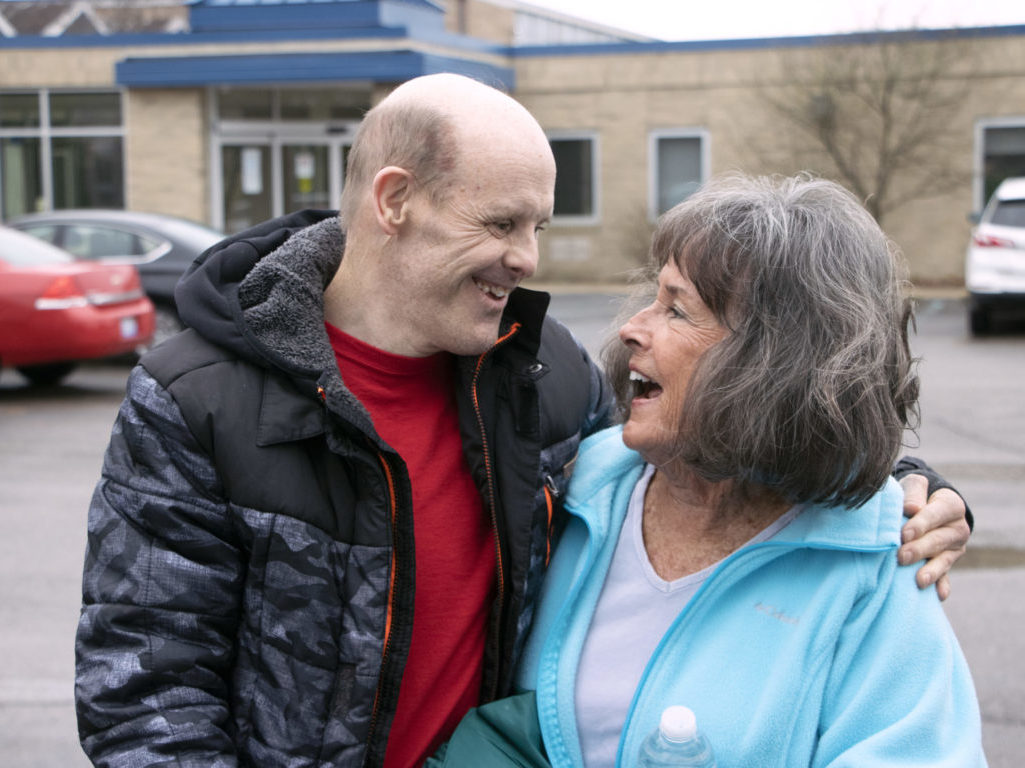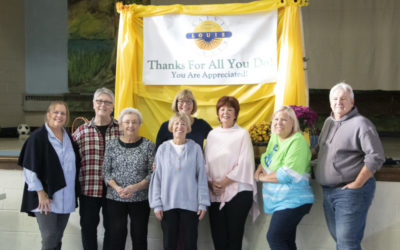Families Supporting Families
St. Louis Center strives to promote family and guardian support and to ensure that the lines of communication are always open between St. Louis Center staff and the loved ones of the residents entrusted to our care.
St. Louis Center Social Services, Nursing, Programs, and Direct Care staff work closely with families and guardians to provide the highest possible level of care. When necessary, overnight accommodations for parents and caregivers can be made available.
Residents
St. Louis Center considers the residents, their families, and SLC staff as part of one overall family. The Center always welcomes family involvement in St. Louis Center events and the Family Association for all who call St. Louis Center their home.
Non-Resident Programs
St. Louis Center also offers a Day Program and Respite Care for individuals with I/DD who reside at home but need regular or occasional alternatives.
Family Resources
Navigating through available resources for a person with intellectual and developmental disabilities is often overwhelming.
 Here are just a few of the questions we receive on a regular basis:
Here are just a few of the questions we receive on a regular basis:
- How can I afford care?
- Where do I find others in my situation?
- Where can I find a spiritual outlet?
- What do these acronyms mean?
To answer these and other inquiries, St. Louis Center has gathered commonly sought after and primarily local resources with which we have either worked with or have heard good things about and have listed them in the tabs below. You can also find definitions of many of the terms and acronyms you will see referring to individuals with I/DD in the last tab.
Even if St. Louis Center is unable to provide a home for your loved one or client, we will work to point you in the right direction! If you don’t see the answers to the questions you have, contact us with your questions and we’ll try our best.
Did you know? … St. Louis Center works frequently with state and county agencies to assist families in offsetting the financial costs for enrollment of their loved one.
Financial
- Community Mental Health Services Programs – Michigan Map by County
- Health Care Counts – Assistance to Apply for Medicaid in Washtenaw County
- MI Bridges – Apply for Medicaid Online
- Michigan Department of Health & Human Services – Assistance Programs
- Michigan State Housing Development Authority (MSHDA)
- Supplemental Security Income (SSI) – Understanding SSI
- (SSI) – About Trusts and SSI Recipients
- Washtenaw County Community Support and Treatment Services
Support Systems & Activities
- All Faith Ministry for disABILITIES
- Ann Arbor Family – Special Needs Directory
- Ann Arbor Observer Disabilities City Guide
- Ann Arbor YMCA
- Autistic Play-Place
- Blueprint for Aging
- Catholic Social Services of Washtenaw County
- Chelsea Wellness Center
- Creating Brighter Futures
- Down Syndrome Support Team of Washtenaw County
- Eastern Michigan Autism Collaborative Center
- Friendship Circle of Michigan
- Harmony Garden Music Therapy Serices
- Intentional Communities Washtenaw
- Judson Center
- Just Us Club
- Kiwanis Aktion Club
- Michigan Department of Health and Human Services – Behavioral Health and Developmental Disabilities Administration
- No More Sidelines
- Program for All-Inclusive Care for the Elderly (PACE) Services
- Saturday Morning Challengers Bowling League (September-April) – Bel-Mark Lanes
- Special Olympics Michigan
- Sunfield Center
- Therapeutic Riding, Inc.
- Together for Choice
- Victory Day in Trenton (and other Michigan schools)
- Washtenaw County Community Support and Treatment Services
- Washtenaw Learning Disabilities Center
Spiritual
- All Faith Ministry for disABILITIES
- Calvin Institute of Christian Worship
- Catholic Charities of Southeast Michigan
- All Belong Center for Inclusive Education – Church Resources
- Diocese of Lansing – Ministry with Persons with disabilities
- Friendship Ministries
- Joni and Friends
- National Catholic Partnership on Disability (NCPD) – Ministry Specific Resources
- United Church of Christ Disabilities Ministries
Commonly Used Terminology
To Clarify…
Intellectual disability
Characterized by significant limitations both in intellectual functioning (reasoning, learning, problem-solving) and in adaptive behavior, which covers a range of everyday social and practical skills; this disability originates before the age of 18.
Developmental disability
An umbrella term that includes intellectual disability but also includes other severe chronic disabilities that can be cognitive, physical, or both; they are apparent before the age of 22 and are likely to be lifelong.
Mental retardation
The term intellectual and developmental disability covers the same population of individuals who were diagnosed previously with mental retardation in number, kind, level, type, duration of disability, and the need of people with this disability for individualized services and supports. Furthermore, every individual who is or was eligible for a diagnosis of mental retardation is eligible for a diagnosis of intellectual disability.
While intellectual and developmental disability is the preferred term, it takes time for language that is used in legislation, regulation, and even for the names of organizations to change. See further details regarding the change in terminology here. St. Louis Center prefers to use and hear the term intellectual and developmental disability.
Alphabetically…
ABA
Applied Behavior Analysis. A discipline devoted to the understanding and improvement of human behavior through skill acquisition and the reduction of problematic behavior in a measurable and accountable manner. Often used interchangeably with behavior modification.
ACA
Affordable Care Act. The federal statute is also known as Obamacare.
ADA
Americans with Disabilities Act of 1990. This comprehensive federal civil rights law makes it unlawful to discriminate in private sector employment against a qualified individual with a disability. The ADA also outlaws discrimination against individuals with disabilities in state and local government services, employment, public accommodations, transportation, and telecommunication.
ADD
Attention Deficit Disorder. A disorder that shows up in the areas of inattention and impulsiveness. It is evidenced by having difficulty organizing and completing tasks correctly, frequent shifting from one activity to another, failure to follow rules. ADD without hyperactivity refers to the disorder without a high degree of atypical motor activity.
ADHD
Attention Deficit Hyperactivity Disorder. This is similar to ADD but includes gross motor overactivity, such as excessive running, talking, or manipulation of objects and excessive fidgeting and restlessness.
ADL
Activities of Daily Living.
AFDC
Aid to Families with Dependent Children. A financial assistance program for single-parent families. Modified in the welfare reforms of 1997.
Accessible
Easy to approach, enter, operate, participate in or use safely, independently, and with dignity by a person with a disability.
Accessibility
Modification of buildings, curbs, and other physical structures to allow easy movement and admittance by a person with a disability. The Americans with Disabilities Act of 1990 mandates accessibility to all public and private facilities. Modifications might include ramps, the use of Braille, and sound adaptations.
Advocacy
Parents (or families), organizations, or volunteers working on behalf of the rights and interests of others (such as people with disabilities). Parents are the best advocates for their children.
Alzheimer’s Disease
A degenerative disease of the brain, causing mental degeneration.
Ambulation
Rolling, crawling, walking, running.
Asperger’s Syndrome
A developmental disorder characterized by a lack of social skills, impaired social relationships, poor coordination, and poor concentration. Children with Asperger’s Disorder have average to above-average intelligence and adequate language skills in the areas of vocabulary and grammar, but they may not understand the subtleties used in conversation such as irony and humor. It is believed that Asperger’s Disorder has a later onset than Autistic Disorder or at least is generally recognized later.
Assistive Technology
Devices used by people with disabilities to compensate for functional limitations and to enhance and increase learning, independence, mobility, communication, environmental control, and choice.
Autism
A developmental disability significantly affecting verbal and nonverbal communication and social relationships, generally evident before age three, which adversely affects a child’s educational performance. Alternate definitions can be found here.
CARF
Commission on Accreditation of Rehabilitation Facilities. A private, nonprofit organization that establishes standards of quality for services to people with disabilities. Adherence to these standards is then measured through an on-site review of an organization requesting accreditation. CARF is the nationally recognized accrediting authority whose sole concern is to promote quality services for people with disabilities. St. Louis Center is CARF accredited.
CM
Case Manager.
CNA
Certified Nurse’s Aide.
Cerebral Palsy (CP)
Conditions that exhibit spasticity, weakness, lack of coordination, or any other motor problem due to organic brain damage. These include sensory and/or movement disorders, seizures, intellectual, learning disabilities, and disorders of behavior. Additional information can be found here.
DHHS
Department of Health & Human Services. Formerly referred to as the Department of Social Services.
Developmental Delay
Being behind other children of the same age in achieving cognitive, adaptive, physical, and social skills.
Diabetes
A general term for diseases characterized by excessive urination (metabolism) and thirst.
Downs Syndrome
A congenital disorder arising from a chromosome defect, causing intellectual impairment and physical abnormalities. It arises from a defect involving chromosome 21, usually an extra copy (trisomy-21).
EHA (PL 9 230)
Education of the Handicapped Act of 1970. A federal law that consolidated previous legislation and established a new Title VI, which became known as Part B. This act established a grant program for educational agencies at the local level. Part B was the precursor to the Education for All Handicapped Children Act of 1975 (PL 94-142) which significantly expanded the educational rights and opportunities for children and youth with disabilities.
Epilepsy
Brief temporary changes in the normal functioning of the brain’s electrical system. Also known as seizures.
HIPAA
The Health Insurance Portability And Accountability Act of 1996 (August 21), Public Law 104-191, amended the Internal Revenue Service Code of 1986. Also known as the Kennedy-Kassebaum Act, the Act includes a section, Title II, entitled Administrative Simplification, requiring: Improved efficiency in healthcare delivery by standardizing electronic data interchange, and 2. Protection of confidentiality and security of health data through setting and enforcing standards.
Habilitation
The process by which a person with developmental disabilities is assisted in acquiring and maintaining life skills to cope more effectively with personal and developmental demands, and to increase the level of physical, mental, vocational, and social ability through services.
IQ
Intelligence Quotient. A derived score from an intelligence test that provides information as to how an individual’s aptitude for learning compares to other individuals of the same age.
Inclusion
To have the opportunity to participate in all activities available in a community; for example, education in a traditional classroom.
Independent Living
When an individual, formerly receiving DDRC services, now lives independently. Or a residential situation in which a person with disabilities lives by him or herself with limited assistance from others.
Intake
Activities performed by a resource coordinator to determine a developmental disability, including gathering information to start a person in a meaningful program of services.
Integration
Participation in the mainstream of community life. Participation means the person with disabilities, including those with intellectual and developmental disabilities, maintains social relationships with family, peers, and non-disabled people in the community. They may work and live alongside people without disabilities.
MSW
Masters in Social Work.
Mainstreaming
A term used by educators to refer to the integration of people with disabilities, including those with intellectual and developmental disabilities into regular classes for part or all of the school day.
Person-Centered Planning (PCP)
Person-centered planning (PCP) is a process for selecting and organizing the services and supports that an older adult or person with a disability may need to live in the community or supported living environment. Most importantly, it is a process that is directed by the person who receives the support.
Pica
A pattern of hoarding and eating non-food materials (rocks, grass, paper, etc.) commonly seen in children and those with autism.
RN
Registered Nurse.
Residential Care Facility
A residential facility that makes available personal services, protective oversight, social care due to a client’s impaired capacity to live independently, and regular supervision available on a 24-hr. basis, but not to the extent that 24-hr. medical or nursing care is required.
Self-determination
Activities that promote or allow for consumer choice and the ability of a consumer or family to use principles of freedom, authority, support, and responsibility.
Family Association
There are many opportunities to meet other families of St. Louis Center residents. Just come on out to any of the variety of events on and off-campus and consider joining our Family Association.
FAMILY ASSOCIATION
Parents support one another in many ways. Family members get to know each other by choosing to participate in various events or by being a member of the Family Association.
Do you have a loved one or are you the guardian of someone who resides at St. Louis Center? Click on the button below if you are interested in joining the Family Association.
Staff treated on Valentines Day by the Family Association
St. Louis Center Family Association gives heart-felt thanks to Center staff It's always important...
Michael Joseph Robinson: A St. Louis Center Success Story
A letter recounting a St. Louis Center success story The impact St. Louis Center has on the...
St. Louis Center Family Association Employee Appreciation
The St. Louis Center Staff have a demanding yet rewarding job. Between managing residents' busy...




